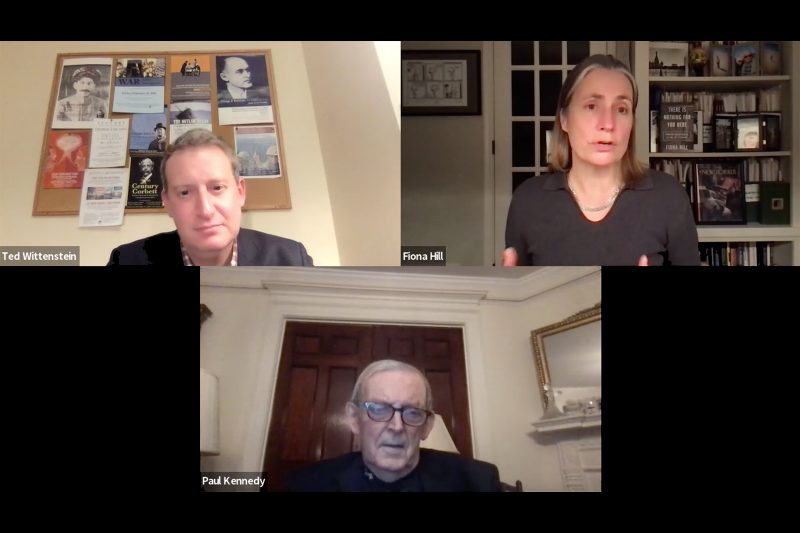On December 7, International Security Studies hosted a Visiting Fellow Discussion Forum featuring Fiona Hill, PhD, senior fellow in the Center on the United States and Europe in the Foreign Policy program at Brookings.
Hill discussed her latest book, “There is Nothing Here for You: Finding Opportunity in the Twenty-First Century,” which chronicles how declining opportunity has set America on the grim path similar to modern Russia. The memoir draws on Hill’s personal journey out of poverty and her unique perspectives as a historian and policy maker. Hill recently served as deputy assistant to the president and senior director for European and Russian affairs on the National Security Council from 2017 to 2019.
Paul Kennedy, J. Richardson Dilworth Professor of History and Global Affairs and the founding director of International Security Studies, moderated the session.
Kennedy kicked off the discussion with an observation on how the different stages in Hill’s life have had a lasting effect on her identity. Hill, a miner’s daughter from Northeastern England, witnessed the impact of mass unemployment from declines in the industrial sector and the threat of war with the former Soviet Union. The region “was one of those places that was forgotten, left behind, discarded. And became the source of discontent and political grievance that manifested itself in multiple ways and northeast of England voting for Brexit in 2016,” Hill said.
These early experiences forced Hill to put her observations in a global context, she explained. “I felt it imperative to study Russian to try to understand it, so I think there is a certain personal level of inquiry that goes, all the way through the book, which then leads into that,” Hill said. She also pointed to parallels on issues of class, race, inequality and lack of economic opportunity between the U.K. and the United States.
Kennedy asked Hill for her analysis on Russia and its recent military advances into neighboring Ukraine. “In a way, Ukraine is exquisitely vulnerable not just territorially and historically, but also because of the nature of its political system, which is heavily dependent on all the guards,” Hill explained. “We’ve got our own oligarchy that has emerged here in the United States,” she said. “We became vulnerable in similar ways to Ukraine […] in the run up to 2016 and subsequently.”
The discussion then shifted to Hill’s experience in former President Donald Trump’s White House. Hill reflected on the hardships of being a woman in her field and the challenges of working in the Trump administration. The audience followed up on this point and prompted Hill to reflect on the impeachment process, which Hill responded by stating that she was surprised to receive a positive reaction from people. “For me, and I know for others, we had taken an oath to the Constitution […] it was the right thing to do, as part of my job,” Hill explained.
More questions from the audience focused on the Russian military activity along the Ukrainian border and the position that the United States should take vis-a-vis Putin’s strategy.
“[The United States] is in a dilemma here […] and we need a lot of creativity and diplomatic effort,” which also includes realizing that “we are not the only players devising a new European security order,” Hill explained.
